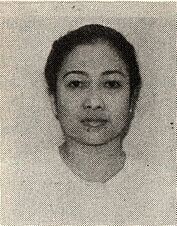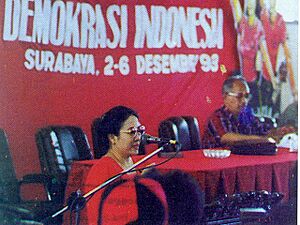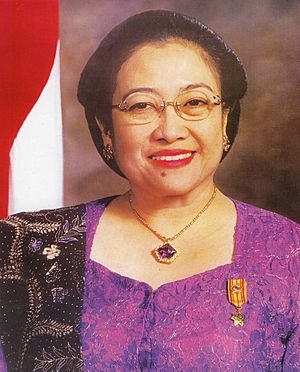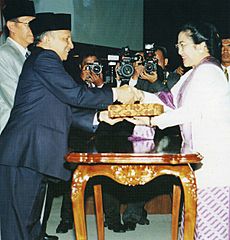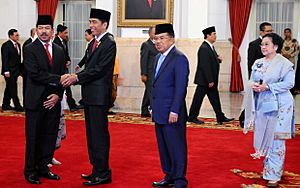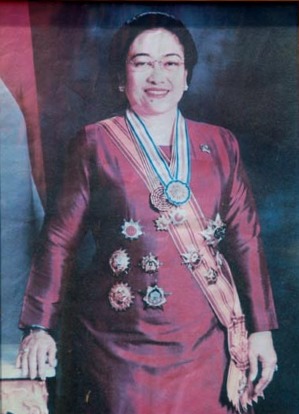Megawati Sukarnoputri facts for kids
Quick facts for kids
Megawati Sukarnoputri
|
|||||||||||||||||||||
|---|---|---|---|---|---|---|---|---|---|---|---|---|---|---|---|---|---|---|---|---|---|
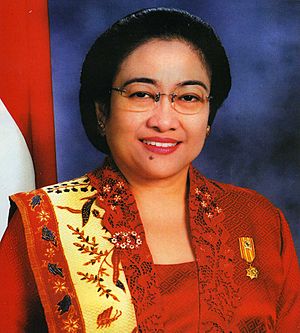
Official portrait, 2001
|
|||||||||||||||||||||
| 5th President of Indonesia | |||||||||||||||||||||
| In office 23 July 2001 – 20 October 2004 |
|||||||||||||||||||||
| Vice President | Hamzah Haz | ||||||||||||||||||||
| Preceded by | Abdurrahman Wahid | ||||||||||||||||||||
| Succeeded by | Susilo Bambang Yudhoyono | ||||||||||||||||||||
| 8th Vice President of Indonesia | |||||||||||||||||||||
| In office 21 October 1999 – 23 July 2001 |
|||||||||||||||||||||
| President | Abdurrahman Wahid | ||||||||||||||||||||
| Preceded by | B. J. Habibie (1998) | ||||||||||||||||||||
| Succeeded by | Hamzah Haz | ||||||||||||||||||||
| Member of House of Representatives | |||||||||||||||||||||
| In office 1 October 1999 – 21 October 1999 |
|||||||||||||||||||||
| Succeeded by | Dwi Ria Latifa | ||||||||||||||||||||
| Constituency | West Java | ||||||||||||||||||||
| In office 1 October 1987 – 30 September 1997 |
|||||||||||||||||||||
| Constituency | Central Java | ||||||||||||||||||||
| General Chairwoman of Indonesian Democratic Party of Struggle | |||||||||||||||||||||
| Assumed office 15 February 1999 |
|||||||||||||||||||||
| Preceded by | New political party | ||||||||||||||||||||
| General Chairwoman of Indonesian Democratic Party | |||||||||||||||||||||
| In office 22 January 1993 – 27 July 1996 |
|||||||||||||||||||||
| Preceded by | Suryadi | ||||||||||||||||||||
| Succeeded by | Suryadi | ||||||||||||||||||||
|
|||||||||||||||||||||
| Personal details | |||||||||||||||||||||
| Born |
Diah Permata Megawati Setiawati Sukarnoputri
23 January 1947 Djokjakarta, Indonesia |
||||||||||||||||||||
| Political party | PDI-P | ||||||||||||||||||||
| Other political affiliations |
PDI (1986–1996) | ||||||||||||||||||||
| Spouses |
|
||||||||||||||||||||
| Children | 3, including Puan Maharani | ||||||||||||||||||||
| Parents |
|
||||||||||||||||||||
| Relatives |
|
||||||||||||||||||||
| Occupation |
|
||||||||||||||||||||
| Signature | |||||||||||||||||||||
| Nickname | Mega | ||||||||||||||||||||
Diah Permata Megawati Setiawati Sukarnoputri (born 23 January 1947) is an Indonesian politician. She served as the fifth president of Indonesia from 2001 to 2004. Before that, she was the eighth vice president from 1999 to 2001 under President Abdurrahman Wahid. Megawati is Indonesia's first and only female president.
She became president in 2001 after President Abdurrahman Wahid was removed from office. She tried to be re-elected in 2004 but lost to Susilo Bambang Yudhoyono. She ran again in 2009 but was defeated a second time. Megawati is the first and current leader of the Indonesian Democratic Party of Struggle (PDI-P). This is one of Indonesia's biggest political parties. She is also the oldest daughter of Indonesia's first president, Sukarno.
Contents
Understanding Megawati's Name
Megawati's last name, Sukarnoputri, means "daughter of Sukarno". It is a patronym, not a family name. Many Javanese people do not have family names. She is often called simply Megawati or Mega. Her name comes from Sanskrit and means 'cloud goddess'. An Indian politician named her at her father Sukarno's request.
Megawati's Early Life and Education
Growing Up in a Political Family
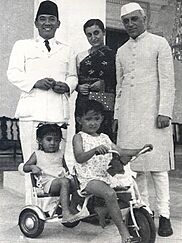
Megawati Sukarnoputri was born in Yogyakarta. Her father, Sukarno, had declared Indonesia's independence from the Netherlands two years earlier in 1945. Her mother was Fatmawati, who came from a noble Minang family. Megawati was Sukarno's second child and second daughter. She grew up in the Merdeka Palace, which was her father's official residence. She enjoyed dancing for her father's guests and developed a love for gardening. Megawati was 19 years old when her father left power in 1966. A new government, led by President Suharto, then took over.
Her College Years
Megawati first went to Universitas Padjadjaran in Bandung to study agriculture. However, she left in 1967 to be with her father after he lost power. In 1970, the year her father passed away, Megawati went to the Universitas Indonesia. There, she studied psychology but left after two years.
Megawati's Political Journey
Starting as a Member of Parliament
In 1986, President Suharto honored Sukarno as a "Proclamation Hero." Megawati attended this ceremony. This event helped the Indonesian Democratic Party (PDI), a government-approved party, to use Sukarno's popularity in the 1987 elections. Megawati, who had seen herself as a housewife, joined the PDI in 1987. She ran for a seat in the People's Representative Council (DPR). The PDI accepted her to improve their public image. Megawati quickly became popular because she was Sukarno's daughter, even though she was not a great speaker. She was elected to the DPR, and also became a member of the People's Consultative Assembly (MPR).
Leading the Indonesian Democratic Party
Megawati was not re-elected to the DPR, but she remained a PDI member. In December 1993, the PDI held a national meeting. The government often tried to control these meetings for opposition parties. Three people wanted to lead the PDI. The current leader, Suryadi, had started to criticize the government. Budi Harjono was favored by the government. The third was Megawati Sukarnoputri. She had so much support that her election seemed certain.
The government tried to stop the election. As the meeting's permit was about to expire, soldiers started to gather. With only two hours left, Megawati announced to the press that she was the de facto (actual) leader because most PDI members supported her. Even with little political experience, she was popular. People liked her because she was Sukarno's daughter and seen as honest. Under her leadership, the PDI gained many followers, especially among the urban poor and middle classes.
Challenges and Party Split
The government was unhappy that they could not stop Megawati's rise. They never officially recognized her, even though her leadership was confirmed in 1994. In 1996, the government organized a special meeting in Medan. At this meeting, Suryadi was re-elected as the party leader. Megawati and her supporters refused to accept this. The PDI then split into two groups: one supporting Megawati and one against her.
The July 27, 1996 Incident
Suryadi threatened to take back the PDI Headquarters in Jakarta. On the morning of July 27, 1996, Suryadi's supporters, reportedly backed by the government, attacked the headquarters. Megawati's supporters fought back. They managed to hold onto the building. A riot followed, and the government responded with a crackdown. The government blamed the riots on the People's Democratic Party (PRD). They continued to recognize Suryadi's group as the official PDI.
1997 Legislative Election
Despite this political setback, Megawati gained public sympathy and her popularity grew. When the 1997 legislative election came, Megawati and her supporters backed the United Development Party (PPP). This was the other approved opposition party.
The Reformasi Era
The 1999 Legislative Election
In mid-1997, Indonesia was hit by the Asian Financial Crisis. The economy suffered greatly. By early 1998, the Indonesian currency, the rupiah, dropped sharply. Public anger about corruption grew. This led to Suharto's resignation in May 1998. Vice President B. J. Habibie then became president, starting the Reformation era (Reformasi). The restrictions on Megawati were lifted, and she began to strengthen her political position. In October 1998, her supporters held a meeting. Megawati's PDI group became known as the Indonesian Democratic Party of Struggle (PDI-P). Megawati was elected its leader and was chosen as the PDI-P's candidate for president.
The PDI-P, along with Abdurrahman Wahid's National Awakening Party (PKB) and Amien Rais' National Mandate Party (PAN), became key forces for reform. Despite their popularity, Megawati, Abdurrahman Wahid, and Amien Rais took a careful approach. They preferred to wait for the 1999 legislative election before making big changes. In November 1998, they all confirmed their commitment to reform in a statement called the Ciganjur Statement.
Election Results and Aftermath
As the elections neared, Megawati, Abdurrahman Wahid, and Amien Rais thought about forming a group against President Habibie and Golkar. In May, they were supposed to announce their cooperation. But Megawati decided not to attend at the last minute because she did not trust Amien. In June, the elections were held. The PDI-P won the most votes, with 33%.
With this victory, Megawati's chances of becoming president looked strong. However, the PPP party did not want a female president. For the 1999 MPR General Session, PDI-P formed a loose alliance with PKB. It seemed the presidential election would be between Megawati and B. J. Habibie. But by late June, Amien Rais formed a group of Islamic parties called the Central Axis. The presidential election became a three-way race when Amien Rais suggested Wahid for president. Wahid did not give a clear answer at first.
The 1999 Presidential Election
Wahid Becomes President
Megawati's PDI-P and PKB alliance faced its first challenge when the MPR met to choose its leader. Megawati supported Matori Abdul Djalil, the PKB leader. But he lost badly to Amien Rais, who had the support of the Central Axis and Golkar. The Golkar and Central Axis alliance also helped Akbar Tandjung become the Head of the DPR. At this point, people worried that Megawati, who represented reform, would be blocked by the political system. PDI-P supporters started gathering in Jakarta.
B. J. Habibie gave a speech about political responsibility that was not well received, leading him to withdraw. The presidential election on October 20, 1999, was between Megawati Sukarnoputri and Abdurrahman Wahid. Megawati took an early lead but lost with 313 votes to Wahid's 373. Megawati's loss caused her supporters to protest. Riots happened in Java and Bali. In the city of Solo, PDI-P crowds attacked Amien's house.
Becoming Vice President
The next day, the MPR met to elect the vice president. PDI-P thought about nominating Megawati again. But they worried that the Central Axis and Golkar would stop her. Instead, PKB nominated Megawati. She faced strong competition from Hamzah Haz, Akbar Tandjung, and General Wiranto. Knowing about the riots, Akbar Tandjung and Wiranto withdrew. Hamzah Haz stayed in the race, but Megawati defeated him 396 to 284. In her speech after being sworn in, she asked for calm.
Megawati's Vice Presidency (1999–2001)
Her Role as Vice President
As vice president, Megawati had a lot of power because her party held many seats in the DPR. President Abdurrahman Wahid asked her to handle problems in Ambon, though she was not fully successful. By August 2000, many people thought Abdurrahman Wahid was not effective as president. Wahid then issued a presidential order, giving Megawati daily control of the government.
Strengthening Her Party Leadership
The first PDI-P Congress was held in Semarang, Central Java, in April 2000. Megawati Sukarnoputri was re-elected as the party leader for a second term.
Megawati strengthened her position within the PDI-P. She took steps to remove potential rivals. Two other candidates, Eros Djarot and Dimyati Hartono, wanted to be party leader. They did not want Megawati to be both party leader and vice president at the same time. Eros was not allowed to participate in the Congress. Feeling disappointed, Eros left PDI-P. In July 2002, he formed a new party. Dimyati also left the party to become a university lecturer. In April 2002, Dimyati formed his own party.
Becoming President
Megawati had a complex relationship with Abdurrahman Wahid. For example, she was not present when he announced a new cabinet in August 2000. At another time, when political support for Wahid was weakening, Megawati defended him. However, in 2001, as a special meeting of the MPR approached, Megawati started to distance herself from Wahid. Her chances of becoming president were improving. She did not make specific comments, but she showed signs of preparing herself. She held a meeting with party leaders the day before the special session began.
Megawati's Presidency (2001–2004)
Her Time as President
On July 23, 2001, the People's Consultative Assembly (MPR) removed Wahid from office. Megawati was then sworn in as the new president. She became the sixth woman to lead a country with a Muslim-majority population. On August 10, 2001, she announced her cabinet, called the Mutual Assistance Cabinet.
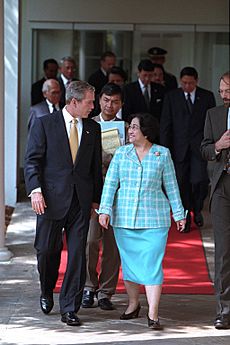
Many people were happy when Megawati, a symbol of opposition to the Suharto government, became president. However, her presidency was sometimes seen as indecisive. She did not always have a clear direction and was known for not acting quickly on important issues. On the positive side, her careful approach helped stabilize Indonesia's move towards democracy. It also improved relationships between the government branches and the military.
Changes in Politics and Law
Megawati's government focused on continuing the reforms started during Abdurrahman Wahid's presidency. These reforms aimed to bring back political stability and democracy. Her administration passed two more constitutional amendments. The third amendment was in November 2001, and the fourth was in August 2002. These changes led to the creation of the Constitutional Court and the end of the Supreme Advisory Council. Her government also wrote many new laws to support these constitutional changes. These laws covered areas like local government, political parties, and elections.
Megawati also set up the first system for direct presidential elections in Indonesia. This meant that Indonesian people could directly choose their president and vice president, not just their lawmakers. Because of this, she earned the title "Mother of Upholding the Constitution."
She also played a key role in forming the Corruption Eradication Commission (KPK). This group works to fight corruption in Indonesia. Megawati believed that many existing legal groups were not clean enough, so the KPK was needed. The idea for such a commission first came up during President BJ Habibie's time.
Her Home Affairs Minister, Hari Sabarno, explained that her government focused on decentralization. This meant giving more power to local regions to manage themselves. The goal was to ensure fair regional autonomy while keeping the country united. To guide this, her government implemented policies that balanced power, distributed money fairly, improved public services, and respected local cultures.
Military Reforms
The Indonesian National Armed Forces changed to fit its new role in a democratic government. It aimed to be more flexible and ready for changes. Megawati stated that the military promised to continue its reforms. It would act professionally as a state defense tool, support democracy, follow the law, and respect human rights.
One of the military's new roles under President Megawati was taking over security operations in Maluku from the police in 2002. This helped bring back stability. President Megawati also brought back the Iskandar Muda Regional Military Command in February 2002.
She passed Law No. 3 of 2002 on National Defense. This law brought big changes to the military. It defined the goals, roles, and how Indonesia's defenses would be carried out. The policy considered Indonesia's geography as an island nation. It made the Indonesian National Armed Forces the main defense group, supported by reserves. Megawati also involved non-governmental organizations to help the military with non-military threats. In 2002, she set aside money for military and police welfare programs, including housing and facility improvements.
Internationally, the military faced an arms embargo from the United States. US President Bill Clinton accused Indonesia of human rights violations in East Timor. This embargo made it hard for Indonesia to buy spare parts for its military planes, like the F-16 Fighting Falcon and Northrop F-5. This reduced the readiness of Indonesian military units. As a result, Megawati sought military cooperation with Russia. This led to Indonesia getting military equipment like Sukhoi Su-27 fighters and Mil Mi-35 attack helicopters to defend the country.
The 2003 Aceh Offensive
On May 19, 2003, the GAM group refused a peace deal. In response, Megawati allowed the Indonesian Military Chief, General Endriartono Sutarto, to start military operations against the GAM separatists in Aceh. General Sutarto also declared martial law in Aceh for six months. The Indonesian government sent 1,500 soldiers and 12,000 police to the province. During this operation, government forces were involved in human rights abuses. Around 1,159 rebels died, and 147 civilians were killed.
Economic Improvements
When Megawati became president, her government worked to rebuild the economy. It had been damaged by the 1997 Asian financial crisis and political problems from 1998 to 2001. Indonesia had a large debt of US$105.8 billion from Suharto's time. As president, she attended meetings with groups like the Paris Club and London Club. She tried to renegotiate Indonesia's debts. In April 2002, she successfully delayed payments of US$5.8 billion of debt. She also prepared a debt payment of Rp.116.3 billion in 2003.
Her government was known for selling off state-owned companies (SOEs). Megawati said this was to protect SOEs from public interference and debt, make them more efficient, and help the private sector grow the economy. Many state companies, like Semen Gresik, Bank Negara Indonesia, Kimia Farma, and especially Indosat, were privatized. In her own notes, Megawati stated that her privatization efforts helped increase economic growth by 4.1% and lower inflation by 5.06%. However, her decision to privatize SOEs, especially Indosat, received criticism. Some accused her of following neoliberal ideas.
Megawati also restarted cooperation with the International Monetary Fund (IMF). This partnership had been paused during Wahid's presidency. She assigned her economic ministers to meet the IMF's requirements. This helped Indonesia receive an IMF loan to strengthen its foreign exchange reserves. The partnership ended in 2003 because Megawati criticized the IMF and World Bank's "confusing" suggestions for Indonesia's economy.
One of her main development goals was Indonesia's marine and fisheries economy. In June 2003, Megawati launched the National Movement for Maritime and Fisheries Development. This program aimed to make the maritime and fisheries sectors, along with maritime tourism, industry, and transport, key drivers of national economic growth. This development was based on sustainable practices, balancing economic growth, fair welfare distribution, and environmental protection.
Domestic Challenges
Under Megawati, Indonesia confirmed its control over Papua. Her government ensured that ideas of independence and self-determination did not gain ground there. During her administration, West Papuan independence activist Theys Eluay was killed. Her government also delayed setting up the Papuan People’s Assembly. Instead, it favored a presidential order to divide Papua into three separate provinces.
Caring for the Environment
In 2003, Megawati started a reforestation program called the National Movement for Forest and Terrain Rehabilitation (GERHAN). This program aimed to fix damaged areas and stop the destruction of forests and land. According to the Minister of Marine Affairs and Fisheries, Rokhmin Dahuri, Megawati has always loved plants. He said her personal hobby made her more aware and concerned about policies related to protecting the environment.
The 2004 General Election
President Megawati Sukarnoputri was the PDI-P's main candidate for the 2004 presidential election. She hoped to be the first woman elected president in a Muslim-majority country. Her running mate was Hasyim Muzadi, the leader of Indonesia's largest Islamic organization, Nahdlatul Ulama (NU). They were assigned the number 2 on the ballot. However, she lost to Susilo Bambang Yudhoyono in the second round. He won with 61% of the votes to her 39% on September 20, 2004. She did not attend the new president's inauguration and never congratulated him.
After the Presidency (2004–Present)
Continuing as PDI-P Leader
The 2009 General Election
On September 11, 2007, Megawati Sukarnoputri announced she would run in the 2009 presidential election. Her party, PDI-P, confirmed her as their presidential candidate on May 15, 2009. Gerindra Party leader Prabowo Subianto was her running mate.
Megawati's 2009 campaign included calls to change Indonesia's voter registration process. She hinted that Yudhoyono's supporters might be trying to manipulate the vote. Megawati Sukarnoputri and Prabowo Subianto lost the election to Susilo Bambang Yudhoyono. They came in second with 26.79% of the votes.
The 2014 General Election
On February 24, 2012, Megawati Sukarnoputri said she was not focusing on polls that showed her as a top contender for the 2014 presidential election. As the Chair of PDI-P, she asked her party to focus on current goals. However, a website domain name seemed to have been registered in her name. In December 2012, the Jakarta Post newspaper suggested a possible reconciliation between the families of Megawati Sukarnoputri and President Susilo Bambang Yudhoyono for the 2014 election. This would involve their parties, PDI-P and the Democratic Party.
For the 2014 general election, the PDI-P and its allies nominated Joko Widodo as their presidential candidate. Joko Widodo won against his opponent Prabowo Subianto in a close election. Later, the relationship between Megawati Sukarnoputri and Joko Widodo became tense. This happened when she pushed for Police Commissary General Budi Gunawan to become the Indonesian Police Chief, even though he was being investigated for corruption. Budi Gunawan had been Megawati's adjutant when she was president. Megawati later criticized Jokowi's decision, saying he was not following the party's goals. Budi Gunawan was eventually appointed as the Director of the State Intelligence Agency.
At the 4th PDI-P National Congress on September 20, 2014, Megawati Sukarnoputri was reappointed as the Chair of PDI-P for the 2015-2020 term.
The 2024 General Election
On January 10, 2024, during the PDI-P's 51st anniversary, Megawati Sukarnoputri gave a speech. She talked about important topics like the neutrality of authorities, democracy, elections, and volunteers. She then made a satirical comment about Joko Widodo, touching on the role of volunteers in winning elections. She stressed that only political parties have the power to nominate presidents and vice presidents. At the end of her speech, Megawati said she was confident that her party's candidates, Ganjar Pranowo and Mahfud MD, would win the 2024 presidential election in one round. She added that they were energetic, intelligent, and cared about ordinary people.
Important Roles After Presidency
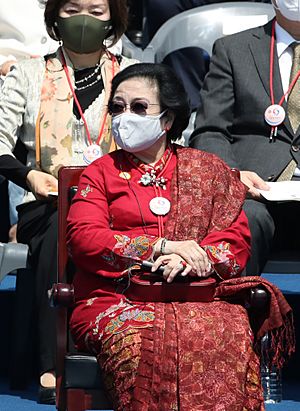
Megawati Sukarnoputri is the only former president who has kept her influence within the government. She has even been appointed to important advisory positions. On March 22, 2018, she was appointed as the Head of the Steering Committee of the Pancasila Ideology Development Agency. She also became the Head of the National Research and Innovation Agency Steering Committee on May 5, 2021, and was formally appointed on September 13, 2021.
Other Activities
On October 4, 2023, Megawati Sukarnoputri met with former Malaysian Prime Minister Mahathir Mohamad in Kuala Lumpur. They discussed various topics, including Indonesia's plan to move its capital city to East Kalimantan.
Megawati's Personal Life
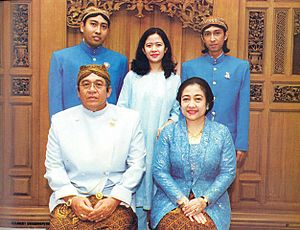
Megawati's first husband was First Lieutenant Surindro Supjarso. They married on June 1, 1968. He died in a plane crash in Biak, West Irian, on January 22, 1970. On June 27, 1972, she married Hassan Gamal Ahmad Hassan, an Egyptian diplomat. Their marriage was ended by the Religious Court less than three months later. She then married Taufiq Kiemas on March 25, 1973. He passed away on June 8, 2013. Megawati has three children: Mohammad Rizki Pratama, Muhammad Prananda Prabowo, and Puan Maharani. Her sons are from her marriage with Surindro, while Puan Maharani is her only child with Taufiq.
Awards and Honors
Awards from Indonesia
 Star of the Republic of Indonesia, 1st Class (August 8, 2001)
Star of the Republic of Indonesia, 1st Class (August 8, 2001) Star of the Republic of Indonesia, 2nd Class (February 3, 2001)
Star of the Republic of Indonesia, 2nd Class (February 3, 2001) Star of Mahaputera, 1st Class (February 3, 2001)
Star of Mahaputera, 1st Class (February 3, 2001) Star of Merit, 1st Class (August 8, 2001)
Star of Merit, 1st Class (August 8, 2001) Star of Culture Parama Dharma (August 8, 2001)
Star of Culture Parama Dharma (August 8, 2001) Star of Yudha Dharma, 1st Class (August 8, 2001)
Star of Yudha Dharma, 1st Class (August 8, 2001) Star of Kartika Eka Paksi, 1st Class (August 8, 2001)
Star of Kartika Eka Paksi, 1st Class (August 8, 2001) Star of Jalasena, 1st Class (August 8, 2001)
Star of Jalasena, 1st Class (August 8, 2001) Star of Swa Bhuwana Paksa, 1st Class (August 8, 2001)
Star of Swa Bhuwana Paksa, 1st Class (August 8, 2001)
Awards from Other Countries
See also
 In Spanish: Megawati Sukarnoputri para niños
In Spanish: Megawati Sukarnoputri para niños


